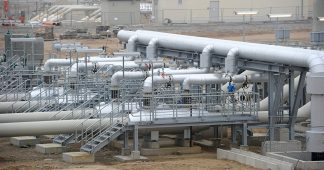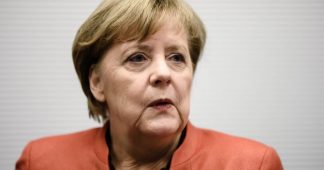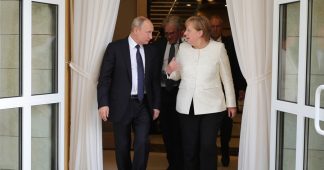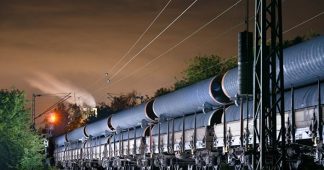‘Climate tariffs’ on fracked ‘molecules of freedom’: German think tank wants to punish US for sanctions against Nord Stream 2
27 Dec, 2019
US sanctions against the Russian Nord Stream 2 pipeline have caused widespread anger in Germany, and even critics of the project are now seeking to slap the American ‘molecules of freedom’ with an eco-tax in reprisal.
The prospect of “crushing sanctions” (included in funding for the US military signed by President Donald Trump last week) has already compelled Swiss-Dutch company Allseas to halt construction on the last remaining portion of the pipeline, which runs under the Baltic Sea, from Russia to Germany.
An economist from the progressive, government-funded think tank has called the sanctions a ploy by the US to sell its own liquefied natural gas (LNG) to Germany and Europe at the highest possible cost, accusing both Washington and Moscow of using gas as a political weapon.
The EU should enact "climate tariffs" against the US in response to sanctions against the bloc for the construction of the deep sea gas pipeline Nord Stream 2 https://t.co/hNWOpvRESH
— Claudia Kemfert (@CKemfert) December 23, 2019
Claudia Kemfert, an economist at the German Institute for Economic Research (DIW), has argued that Nord Stream 2 is “environmentally harmful, economically unnecessary and financially unprofitable” – but described the US sanctions as “unacceptable” and requiring a response from the EU.
Europe should consider imposing climate tariffs on the United States so that environmentally harmful fracking gas cannot be exported from the United States to Germany and Europe
While the government in Berlin has expressed“regret” over US “interference in our domestic affairs,” it has done nothing to counter it. Kemfert’s initiative, first mentioned in the daily Handelsblatt earlier this week, appears to be the only proposed reprisal so far.
This may also be the first time anyone has criticized American LNG as environmentally harmful; most of it is produced by hydraulic fracturing, or “fracking,” a practice that critics say causes earthquakes and pollutes the water with toxic substances.
Ironically, Germany is one of Europe’s biggest carbon emitters, because almost half of its energy generation comes from burning coal. Berlin has directed immense subsidies to wind, solar, and biofuels over the past decade, while seeking to shut down its nuclear power plants – resulting in some of the highest retail prices for electricity in Europe, and leaving Germany desperate for cheaper energy sources, such as Russian gas.
Meanwhile, the US envoy to Germany, Richard Grenell, called the sanctions “a very pro-European decision” and said that thankful “European diplomats” have been calling him about it. While he did not specify which European countries they represented, Poland and the Baltic States have been outspokenly opposed to Nord Stream 2. So has Ukraine, which is in Europe but not an EU member.
Objections to the pipeline from Washington, Kiev, and Warsaw have been mainly political in nature, dealing with the potential loss of leverage more than anything else. The US has condemned the EU’s “increasing dependency” on Russian gas, while offering its own LNG – officially described as “molecules of freedom” – as an alternative, though at a much higher price.
Warsaw and Kiev, on the other hand, have bemoaned that Nord Stream 2 would rob them of billions of dollars in transit fees they’ve been collecting from Russia over the years. The Baltic pipeline was conceived after a 2009 dispute between Ukraine and Russia, when Kiev effectively blocked the flow of gas to Europe during a vicious cold snap in order to get a better deal from Moscow.
Published at https://www.rt.com/business/476902-germany-sanctions-climate-tariffs/











